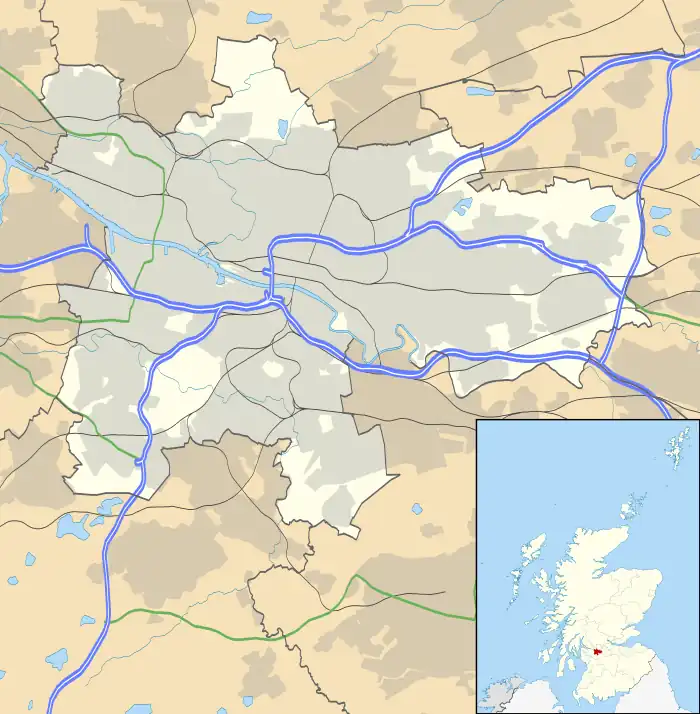| Partick Burgh Hall | |
|---|---|
.jpg.webp) Partick Burgh Hall | |
| Location | Partick |
| Coordinates | 55°52′17″N 4°18′31″W / 55.8713°N 4.3085°W |
| Built | 1872 |
| Architect | William Leiper |
| Architectural style(s) | French Renaissance style |
Listed Building – Category B | |
| Designated | 15 December 1970 |
| Reference no. | LB32852 |
 Shown in Glasgow | |
Partick Burgh Hall is a municipal facility in Burgh Hall Street, Partick, Scotland. The hall, which was the headquarters of Partick Burgh Council in the early 20th century, is a Category B listed building.[1]
History
.jpg.webp)
The building was commissioned to replace a small Palazzo-style building in Anderson Street which had served as the administration centre for the burgh and had been completed in 1853.[2][3] After a period of rapid population expansion associated with the growth in the shipbuilding industry, civic leaders decided to procure a purpose-built burgh hall: the site selected was the southern section of piece of open ground, the rest of which was developed at the same time as Hamilton Crescent, the home of the West of Scotland Cricket Club.[4][5][6]
The new building, which was designed by William Leiper in the French Renaissance style, was completed in 1872.[7] The design involved an asymmetrical main frontage with thirteen bays facing Burgh Hall Street; the western section of five bays, the middle three of which projected slightly forward, formed the main frontispiece; there were windows in the middle three bays on the ground floor with an arched doorway in the western bay; there were panels carved by John Mossman depicting compassion, truth and justice above the ground floor windows[8] and a large round-headed window in the middle bay on the first floor with a pediment above; there was also an ornate bell tower at roof level.[9]
The burgh hall was the headquarters of Partick Burgh Council until the burgh was annexed by Glasgow in 1912.[10][11] A comprehensive refurbishment of the hall costing £800,000 was carried out a design by ZM Architecture and completed in 2004;[12] the work, which involved the creation of a 10 metres (33 ft) high foyer giving access to all three of the main halls as well as the restoration to the stained glass windows,[13] was commended at the Scottish Design Awards in 2004.[14]
In June 2019 it was announced that the hall, which continues to function as a community centre,[15] would also become a "Space for Growth Hub" providing support for start-up businesses.[16]
See also
References
- ↑ Historic Environment Scotland. "3-9A (odd numbers) Burgh Hall Street, Burgh Halls (Category B Listed Building) (LB32852)". Retrieved 17 April 2020.
- ↑ "Partick". Scotcities. Retrieved 17 April 2020.
- ↑ "Partick Police Court (former)". Architecture Glasgow. Retrieved 17 April 2020.
- ↑ "Ordnance Survey Map". 1860. Retrieved 17 April 2020.
- ↑ "History". West of Scotland Cricket Club. Retrieved 17 April 2020.
- ↑ "Look up Glasgow: 5 hidden monuments". The Scotsman. 28 January 2016. Retrieved 17 April 2020.
- ↑ "William Leiper". Dictionary of Scottish Architects. Retrieved 17 April 2020.
- ↑ "Partick Burgh Hall". Glasgow Sculpture. Retrieved 17 April 2020.
- ↑ "Glasgow Roofs". Glasgow Gallivanter. Retrieved 17 April 2020.
- ↑ "Partick Burgh Hall". The Glasgow Story. Retrieved 17 April 2020.
- ↑ "How Glasgow annexed Govan and Partick 100 years ago". BBC. 7 August 2012. Retrieved 17 April 2020.
- ↑ "Fire crews save blaze-hit city hall". Glasgow Times. 24 October 2008. Retrieved 15 November 2020.
- ↑ Historic Environment Scotland. "Partick Burgh Hall (162033)". Canmore. Retrieved 17 April 2020.
- ↑ "Partick Burgh Hall". OM Studios. Retrieved 17 April 2020.
- ↑ "Partick Burgh Hall". glasgowlife.org.uk. Archived from the original on 23 January 2012. Retrieved 27 September 2020.
- ↑ "Major £20million project to invest in community spaces given green light by council". Glasgow Live. 14 June 2019. Retrieved 17 April 2020.